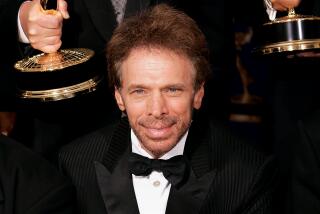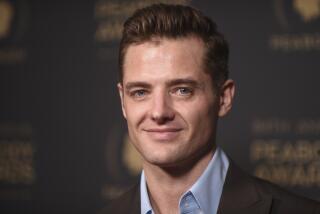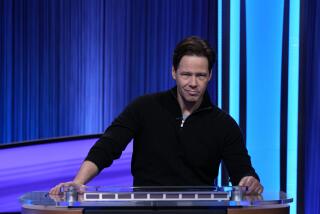He Won, He’s Gay . . . Now Get Over It
- Share via
The good news for the gay community: The big winner on the “Survivor” television show was an openly gay man. The bad news: It was Richard Hatch.
“This guy is not exactly a great role model,” said Andrea Askowitz, director of Bike Out, a nonprofit group that takes inner-city gay teenagers on bicycle tours. “He was pompous and arrogant and obnoxious.”
But Hatch, a 39-year-old corporate trainer who displayed a combination of arrogance and savvy deal-making, also had a lot of fans in the gay community who perhaps didn’t admire his character or physique, but got caught up in the fact that, with America watching, he beat out all the straights. “Tons of people were here Wednesday night,” said Carl White, a bartender at the popular Revolver video bar in West Hollywood, which organized weekly “Survivor Nights.” “And everyone went crazy when he won.”
Even some naysayers were eventually won over. “We misjudged him,” said Ron Boudreau, who cuts hair at his West Hollywood Salon. “When the series started, I had one thing to say to him--’liposuction.’ Even Rudy [Boesch, at 72,] looked better.” Being no hunk, Hatch is perhaps the most non-stereotypical, openly gay person to get famous on television. “He may not have had the nicest personality, but he won by being very crafty and watching everything going on around him very carefully. Maybe that’s what a gay guy who works in the corporate world has to learn to do to succeed.”
Sitcom writer Terry Maloney Haley, of Toluca Lake, who admits being so addicted to “Survivor” that he watched every episode, fears the show might have hardened stereotypes instead of breaking one. “I think the show might have inadvertently been a commercial for homophobia,” said Haley, who wrote for “Married With Children” and now writes for the upcoming CBS series, “Kiss Me Guido.” “There is an old, homophobic stereotype that goes: ‘If you’re gay, you must have something to hide.’ The fact that the winner was the most cold and calculating of the players, who happens to be gay, might fit in with that,” he said.
On the other hand, Haley said, the character often perceived as the most heroic, Rudy, the ex-Navy SEAL, used the word “queer” on the show. “But eventually, he ended up rubbing lotion on Richard’s shoulders and voting for him, so maybe spending time with a gay person made a difference.”
Apart from the public’s perceptions of Hatch, did his involvement in “Survivor” mark significant changes for television?
Peter Nardi, professor of sociology at Claremont Colleges and past president of the Gay & Lesbian Alliance Against Defamation, thinks it did. He compared “Survivor” to “The Real World,” an MTV reality show that debuted in 1992.
“On the first series of that show, one of the roommates was gay, and that was his identity,” Nardi said. “People talking about the show would refer to him as the gay character. What strikes me about ‘Survivor’ is that the talk about Richard has been about his personality--not the fact that he is gay. People referred to him as the ‘obnoxious one’ or the ‘conniving one’ or the ‘smart one.’ But ‘gay one’ was way down on the list.”
Nardi said he believes this is a healthy development, one that speaks of increased acceptance of the gay community as multifaceted and diverse. “That guy did not have to carry the mantle of having to represent all gay people.”
On the other hand, the situation of the gay person in “Survivor” was in some ways a throwback to the time when television portrayed gay people only in situations where there was little possibility of relationships or sex.
“They were either the evil, predatory villain, or they had to be all positive and good with no faults,” said Nardi. “They were desexualized, with no chance of relationships or even gay friends. It’s interesting that on an island surrounded by straight people, that was kind of true of this show.”
Either way, Richard Hatch is now, and perhaps for only a short time to come, one of the most prominent gay people to become part of the popular culture. People seem to admire and despise him in equal measure, but not because of his sexual orientation.
“If we hadn’t known that Richard was gay, he could have died with that secret,” said producer and artist manager Arnold Stiefel. “Who wanted to know?”
More to Read
The complete guide to home viewing
Get Screen Gab for everything about the TV shows and streaming movies everyone’s talking about.
You may occasionally receive promotional content from the Los Angeles Times.







